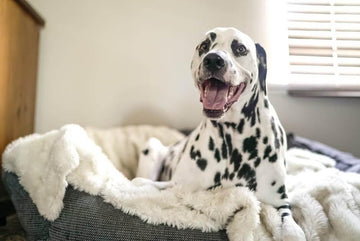
A dog's tongue has about 1,700 taste buds. It serves as an intricate sensory organ that guides your dog's interactions with the world.
While you often associate this remarkable tongue with tasting food, it can also lead your furry friends to engage in curious behaviors. If you've ever noticed your furry friend licking the air often, you're not alone. As a result, you may wonder "Why do dogs lick air?"
Below is a comprehensive guide on the common reasons why dogs lick the air. Keep reading to learn more.
Hunger or Thirst
If your dog starts licking the air before it's time to eat, they're probably excited about food. This can also happen when you're cooking something delicious, like roast chicken, or after giving them a sticky treat. It's a normal canine behavior.
When your dog's mouth gets dry, they may start air licking too. Check your dog's water bowl when you're at home. If you're outside with your dog, take a break for water when they start air-licking.
Always make sure they have enough water, especially before giving them sticky treats. If it's their regular mealtime, go ahead and feed them as usual.
But don't rush to give them food or treats every time they air lick. It may lead to other dog behavior issues.
Foreign Bodies in the Dog's Nose or Mouth
A dog licking air may be due to foreign objects in its mouth. This can happen if your dog eats peanut butter and it gets stuck to the roof of their mouth. Anything else trapped in their mouth such as sticks and bones, can also cause it.
Dogs can also air lick when foreign bodies are lodged in their noses. These foreign items include grass seeds, insects, dust, or pollen.
If your dog suddenly starts air licking, check inside their mouth and nose. Look for anything stuck on the roof of their mouth or inside the nose. You can try to remove it yourself or get help from your vet.
Additionally, you can prevent foreign bodies from getting stuck in your dog's mouth. Avoid letting them chew on things that can break or splinter. It can not only cause mouth injuries but also serious stomach problems.
Mouth Injuries
If your dog starts air licking, it may be because they have a mouth injury. This includes minor cuts, scrapes, or other small injuries. Sometimes, you'll notice other signs like your dog pawing at their face.
To figure out what's wrong, look closely at your dog to see where it may be hurting. If the injury is significant or infected, take your dog to the vet. Also, clean your dog's grass pads to keep away any sharp objects that can cause injuries.
Need for Human Attention
Most dog behaviors are learned. As a dog owner, you can unintentionally encourage air licking by giving affection.
If you react every time you see your dog air-licking, your furry friend learns that this behavior gets them attention. As a result, they may do it more often to keep you focused on them. Signs that you may be reinforcing this behavior include petting or talking with them.
To address this, try to ignore it. When your dog realizes they don't get attention for it, they'll gradually do it less.
Flehmen Response
Dogs have a special organ called Jacobson's or vomeronasal organ in their noses. This helps them detect and make sense of strong scents such as urine.
When dogs catch a whiff of these potent odors, they exhibit what's called the Flehmen response. It includes actions like flaring nostrils, curling lips, and even licking the air. These behaviors help your dog draw the scent deeper into their nasal passages-where the vomeronasal organ is located.
You're likely to witness the Flehmen response when you're out for walks with your dog. But it can also happen indoors. Luckily, the Flehmen response is natural and there is no need to change the behavior.
Dental Problems
When your dog starts air licking, it may be a sign of dental problems like a loose tooth. Dental issues in dogs can be harmful because they can lead to root abscesses. If left untreated, the oral bacteria can spread to vital organs like the heart, liver, or kidneys.
Ensure your dog gets regular dental care to prevent issues. When your dog starts air licking, look out for other signs of dental problems, such as bad breath, excessive drooling, and difficulty chewing. If you notice any of these symptoms, take your furry friend to the vet for an oral examination.
Skin Issues
Dogs often resort to licking their skin when plagued by pesky fleas, parasites, or allergies. However, when you reprimand them for licking, your dog may resort to air licking.
Challenges such as obesity or arthritis may also lead to dog air licking. They may lick the air to mentally attempt to relieve the itch they can't physically reach.
To tackle skin issues, several effective treatments are available, including:
- Use of flea prevention products
- Conduct a food allergy diet trial
- Introduce omega fatty acids into your dog's diet
Your veterinarian can also offer recommendations on feeding a special skin diet. Additionally, they can prescribe anti-itch drugs. Don't forget to clean its grass potty pad.
Anxiety and Stress Response
If your dog starts licking, it can be a sign of stress and anxiety. Loud noises such as fireworks, thunderstorms, or even raised voices can cause stress. Some dogs may also feel anxious when left alone.
To understand the cause of your dog's anxiety and stress, carefully observe when the licking behavior starts. Look out for other signs of stress such as itching and pacing. They may also tuck their tail between their legs and flatten their ears against their head.
To address this, the first step is to remove your dog from the stressful situation if possible. If you can't avoid stressors, such as thunderstorms, consider giving your dog Benadryl to help ease their anxiety. Ensure you consult your vet before giving your dog the prescription.
For separation anxiety, redirect your dog's focus with a fun distraction. You can buy them interactive dog toys or enroll them in doggy daycare.
Gastrointestinal Disorders
Excessive air licking in dogs can be a sign of underlying gastrointestinal problems. This behavior can indicate issues like irritable bowel syndrome, nausea, pancreatitis, upset stomach, and more.
To be sure, check out the additional symptoms of digestive problems, such as diarrhea, bloating, and excessive gas production.
To effectively address these issues, collaborate with your veterinarian for a thorough examination. Your vet may collect blood and fecal samples. They may also conduct diagnostic imaging tests like ultrasounds and X-rays for proper diagnosis.
Cognitive Dysfunction
Canine Cognitive Dysfunction Syndrome, or CDS may be the cause of your dog's air licking. It is akin to Alzheimer's and causes your dog's brain cells to deteriorate as they grow older. The disease often affects dogs aged eight and older.
One of the signs of this brain decline is the potential for repetitive actions, such as air licking. If you notice your senior dog suddenly engaging in repetitive air licking, it may be a sign of canine cognitive impairment.
Consult your veterinarian for expert guidance. They can conduct a thorough evaluation to determine if cognitive dysfunction is the cause of your dog's behavior.
Compulsive Disorders
Is your dog repeatedly licking the air and your veterinarian has ruled out medical problems?
It may indicate compulsive behavior. Dogs can experience Obsessive Compulsive Disorder (OCD), leading them to engage in repetitive actions.
In severe instances, dogs may engage in repetitive behaviors to the point of self-harm. For example, your dog may excessively air lick until their tongue becomes dry and cracked.
Usually, dogs with OCD focus on one particular compulsive behavior and you may not observe multiple compulsive behaviors concurrently. Ensure you diagnose the compulsive disorder to be sure. It will help you find proper relief techniques such as getting dog potty pads.
Once your dog receives a diagnosis, collaborate with an animal behaviorist. They will help you develop strategies for reducing your compulsive behavior.
Why Do Dogs Lick Air? A Dog Owner's Tips for Air-Licking
As a responsible dog owner, you must ensure your furry companion is happy and healthy. So, if you're wondering why dogs lick the air and how to address this behavior, here are some tips:
Observe the Context
Pay attention to when your dog starts air-licking. Is it happening in specific situations or locations? Understanding the context will give you valuable clues.
Consult a Veterinarian
If your dog starts air-licking excessively, consult your veterinarian. Air-licking can be a sign of a medical issue. They can help you rule out any underlying health problems first.
Training and Positive Reinforcement
Work with a professional dog trainer or behaviorist if the air-licking becomes problematic. It will help you address the behavior using positive reinforcement training techniques. Also, ensure you get them all-natural grass potty pads to improve their quality of life indoors.
Transform Your Dog's Life to Healthy Living
If you've ever been asked, "Why do dogs lick air?" Gotta Grass can provide you with the answers you seek. We also offer indoor and outdoor grass pads to help keep your furry friend healthy and content.
Feel free to contact us today to learn more.




